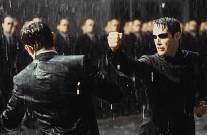|
|
||||
|
|
by John P. McCarthy  Where ultimate meaning is concerned, the Wachowski Brothers come out of the closet in the cataclysmic climax to their trilogy. The Matrix Revolutions is as religious -- defined in the broadest, most philosophical sense -- a movie as you'll ever see. It's certainly among the most overtly religious action movies ever made. The work of high-tech evangelism is consumed with big philosophical questions and is inlaid with Christian themes and imagery. The Wachowskis have packaged their worldview in a tri-part opus that has demonstrated its appeal to spiritually hungry young cinephiles of the Internet age. By itself, however, the message may not satisfy those more comfortable playing video games than contemplating human destiny. And those who don't go in for the special effects may gag at the corny and traditional religious content. Pared down to its essentials, The Matrix message seems more schematic here than in the first two movies. Cryptic lines are delivered in the now familiar robotic manner, but you don't have to be a Matrix expert to understand the message. You just have to remember your Sunday school lessons. The movie is divided into three sections. Savior Neo (Keanu Reeves) finds himself trapped between the real world and the Matrix just as he was at the end of The Matrix Reloaded. In the first part, Trinity and Morpheus free Neo after visiting the Oracle and the Frenchman. In the second section, with twenty hours until annihilation, the Machines bear down and Zion is defended in a ferocious battle. This siege emerges as a tremendously exciting piece of action filmmaking. Meanwhile Neo and Trinity pilot a ship to the heart of the Matrix for the movie's final phase -- a titanic confrontation between Neo and Mr. Smith that represents the eternal struggle between life, peace, and love and their negation, nihilism. Mr. Smith is a rogue program multiplying out of control and Neo is the warrior who must stop him to achieve the ultimate goal of peace. This is an old-fashioned story about sacrifice and heroism based on belief in something greater than oneself. Neo and Trinity's love is redemptive as is the faith certain people have in Neo. This blind faith breeds heroic acts of courage although the battle between good and evil, life and its negation, will continue. The end of a trilogy such as this is bound to be a letdown, especially for devotees. Yet the movie seems rendered with such technical virtuosity that it's hard not to feel awed by the dense, beautiful images of Neo sacrificing himself in the ultimate video game. It boils down to the catchphrase: "Do you believe in the One?" This conclusion may not be everyone's cup of tea but you had to see it coming. Believe or not. (Released by Warner Bros. and rated "R" for scie-fi violence and brief sexual content.) |
||
|
© 2026 - ReelTalk Movie Reviews Website designed by Dot Pitch Studios, LLC |



